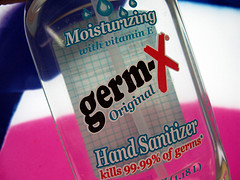Study: Hand Sanitizer Not Terribly Good At Fighting Cold Or Flu
Only a few months after the FDA said that “antibacterial” soaps containing Triclosan might be just as effective as regular ol’ soap, a University of Virginia study claims that alcohol-based hand sanitizers don’t really put a ding in the number of people who catch a cold or the flu.
The study — funded by Dial Corp., which produces its own brand of alcohol-based sanitizer — found a 42% rate of rhinovirus (common cold) infections among those who used the sanitizers, compared to 51% percent for test subjects who didn’t take any precautions. For influenza, the rate of infection was 12% for sanitizer users vs. 15% for the control group.
“We all thought if you used hand disinfectants, it would have an impact,” said the team’s research leader, who called the findings “very surprising.”
He added that these findings mean more research is needed into how rhinovirus and influenza are transmitted. If the bugs are spread via the air, as opposed to physical contact, then that might explain why the rates of infection were not lower among sanitizer users.
The researcher did point out that studies have shown sanitizers to be effective on cutting down the transmission of gastrointestinal diseases.
UVa study: Hand sanitizer of little help preventing colds, flu [Daily Progress]
Thanks to Tim for the tip!
Want more consumer news? Visit our parent organization, Consumer Reports, for the latest on scams, recalls, and other consumer issues.


